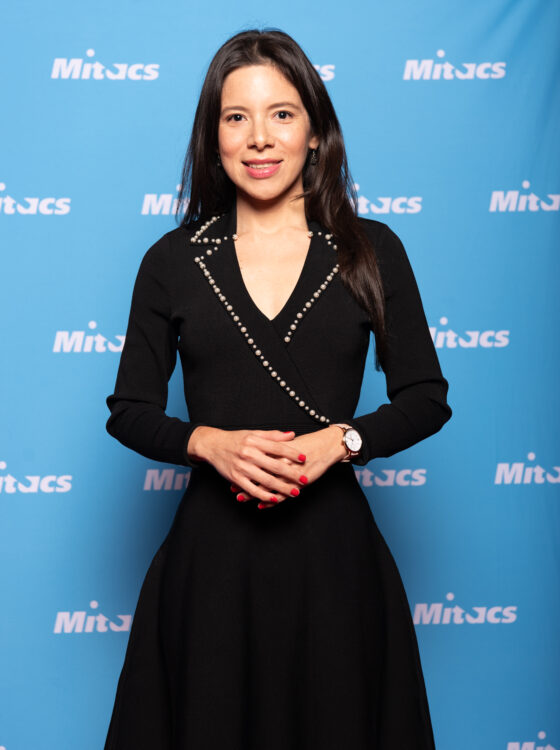Every day, Prisca Bustamante wakes up appreciating the beauty of the world she sees around her. That’s in good part why she has made it her mission to ensure no one loses their eyesight needlessly to eye cancer — a condition that often goes undiagnosed until it’s too late — by developing the world’s first early detection blood test for an eye tumour.
The breakthrough work has earned Bustamante the prestigious Mitacs Award for Outstanding Innovation — PhD, awarded by Mitacs, a national innovation organization that fosters growth by solving business challenges with research solutions from academic institutions. The award was presented at a virtual ceremony on November 23.
Early detection improves survival rate
Bustamante — a PhD candidate researcher working at the Research Institute of the McGill University Health Centre under Dr. Julia Burnier in the Department of Oncology and Pathology at McGill University — is being recognized for developing the first-ever liquid biopsy for uveal melanoma, the most common intra-ocular tumour found in adults. Though rare, the disease can be lethal in a small percentage of Canadians who develop it each year due to the lack of early detection methods.
“If we can learn how to screen patients at early stages of eye cancer, they can be provided treatment options sooner, increasing their chance of survival,” said Bustamante, who is dedicating her research to eye cancer because she believes strongly that people deserve a chance to preserve their sight. “We can say it’s rare, but 10 eye cancer patients belong to 10 families who will also be affected by the outcome of the disease,” she said.
The challenge with current diagnosis methods is that they require highly trained staff to take pictures inside the eye using specialized equipment. This makes the diagnosis often challenging, and tumours won’t necessarily be detected until they are at an advanced stage. The other option is to remove a piece of the tumour for a biopsy, which is an invasive surgical procedure that comes with risks to the eye. Patients also face the possibility of losing an eye when eye cancer is left untreated.
Routine bloodwork

Bustamante’s groundbreaking diagnostic approach uses simple, routine bloodwork. What’s novel is that she has successfully identified small DNA fragments in the blood, called liquid biopsy-based biomarkers, which accurately relay information about the presence and malignancy of an eye tumour at its earliest stage. She applies a technology called digital droplet PCR to develop a system for early detection of eye cancer and, after proving her approach in test dish cultures and animal models, she is currently running a clinical study at the McGill Academic Eye Centre involving ocular cancer patients as well as patients with benign eye lesions.
“We’re looking for genetic material in the blood that signals a specific mutation,” Bustamante explained. “Our test can tell us if those fragments are there, as well as how many are present. What’s unique is that the test can tell us a number that correlates to the size and severity of the cancer, making it possible to regularly monitor patients using simple blood draws — similar to monitoring PSA levels to treat prostate cancer — so that treatment can start as soon as it’s required,” she said.
Bustamante’s research is expected to have a major impact on eye cancer patients, ultimately helping to save lives and retain eyesight through the development of an easily accessible screening test that can be deployed at ophthalmology clinics. She has presented her work at several major world conferences in the U.S., Portugal and Germany, and considers the training provided by Mitacs to be a valuable asset in helping to further her research career.
“As part of my PhD studies, I learn about molecular biology and pathology, but the Mitacs training gives me the opportunity to learn important skills like time management and strong communication that I also need to manage my project successfully,” said Bustamante, who completed her Master’s degree in Mexico and started her Mitacs-funded research in 2019 in Dr. Burnier’s laboratory.
The Mitacs Award for Outstanding Innovation — PhD is presented to a Mitacs intern who has made a significant achievement in research and development innovation during their Mitacs-funded research.
Shaping the future of innovation
Bustamante is one of eight Mitacs award winners nationally, chosen from thousands of researchers who take part in Mitacs programs each year. The remaining seven recipients were recognized for outstanding innovation, commercialization, or exceptional leadership in other areas of research.
In congratulating the winners, Mitacs CEO and Scientific Director John Hepburn remarked on the importance of providing Canadian innovators with opportunities for experiential skills development through strategic partnership between industry, government and academia.
“Collaborative innovation is a proven and productive approach to research that ultimately helps to deploy top talent within the Canadian economy,” Hepburn said, noting that Mitacs is honoured to play a role in helping to advance important research within Canada. “Whether our researchers develop groundbreaking ideas by tapping into resources across our country or through international collaboration, their breakthrough work is benefitting all Canadians – and it’s this talent that is shaping the future of innovation.”
Get more information about the winners of the 2021 Mitacs awards.
